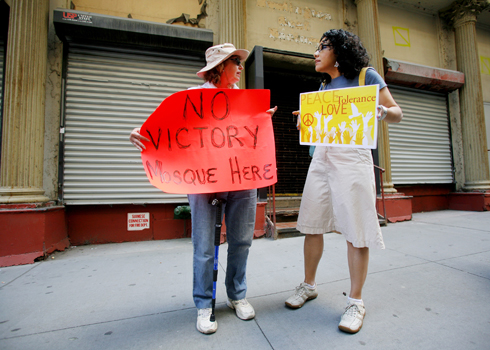You know the stories, by now: The violent attack on a cab driver, the arson in Tennessee, the sometimes unbelievable vitriol associated with a Manhattan Islamic community center. The plans by a radical pastor to burn the holy book of another religion, plans that have been condemned even by his compatriots on the fringe of American thought.
But why? And why now?
“It’s been percolating,” John Esposito, the director of the Prince Alwaleed Bin Talal Center for Muslim-Christian Understanding at Georgetown, told TPM. As Esposito tells it, America has had a problem with anti-Muslim prejudice since before Sept. 11, 2001. But it was contained, in a way, and even after 9/11 “things were pretty stabilized.” The uptick began in 2004, and now it’s rising to the surface.
“What I think has happened with the mosque at Ground Zero, what it’s done is surfaced in the American public square … what in a way was kind of a dirty little secret,” he said. “It exposed the tip of the iceberg, something that’s been out there but hasn’t been on people’s radar screens.”
What’s more is that politicians like Newt Gingrich — politicians with very real chances of running for president — have legitimized anti-Muslim language.
People now “felt free to appropriate phrases, like building a mosque in the Midwest is building a monument to terrorism,” Esposito said. Gingrich “is legitimizing [that language], saying to a lot of followers of his who may not be normally extremist or bigoted, this is an OK perspective.”
Omid Safi, a professor of Islamic studies at the University of North Carolina, said he believes anti-Muslim sentiment has been steadily increasing.
“It’s not the case anymore that the explosion of hostilities are actually tied to an external trigger,” Safi told TPM. “It’s not that there’s 9/11 or 7/7 or something like that that allows this burst of xenophobia to take place. It’s almost like there’s this constant ratcheting up of discourse.”
“Voices that five years ago were considered crazy, xenophobic, radical … have been co-opted by people at the Fox News level of things,” he said. And people like Daniel Pipes, who have been at the forefront of trying to convince Americans that Islam is a threat, are claiming victory: “For the first time in 15 years, I feel I may be on the winning team,” Pipes wrote yesterday.
For Yvonne Haddad, professor in Georgetown’s School of Foreign Service, the rhetoric from more mainstream politicians is directly tied to the midterms.
“Given the fact that we’re in an election cycle, conservative voices have found a way of using it, and liberals are just hiding,” she said. “A few are speaking out. But they are muffled.”
In the months after 9/11, President George W. Bush managed to stem what could have been a wave of anti-Muslim discrimination, Safi said.
“If you go back to the days after 9/11, someone like George Bush with whom I have substantial differences of opinion, said Islam is a religion of peace,” he said. “That spared the nation a lot of the angry vitriol we’re seeing now.”
Some believe that President Obama can’t do the same thing because of the widely believed false rumors that he is a Muslim himself. “He can’t come out and defend Muslims the way Bush did,” Haddad said. “He’ll be tarred and feathered.”
The professors TPM spoke with all said that the anger directed at Muslims is, to an extent, not about Muslims at all. It’s about “The Other.”
“Human nature need an Other,” Esposito said. “You look for the Other to blame.”
“If it wasn’t Muslims it would be gays. If it wasn’t gays, it would be Hispanics,” Safi said. “Muslims are the flavor of the day.”
As Esposito put it, Americans are worried about the economy, and they’re worried about terrorism, especially with the failed attacks over the past year or so. Those worries have fueled hatred against two groups: Hispanic immigrants and Muslims.
“The foreignness of Islam, the foreignness of imams, because of that, and the foreignness of their beliefs and practices, [some Americans think] these people want to impose here,” he said.
It’s something that’s happened before, with Catholics, with Jews, with the Japanese. “This kind of thing,” Haddad said, “is not new in American history.”






